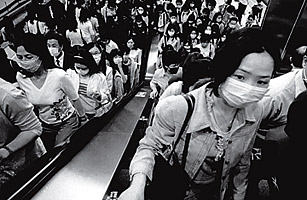
Taiwan, 2003. Commuters in Taipei take precautions at the height of the SARS epidemic.
(3 of 3)
As the virus ebbed, we began to look for the lessons — medical, personal and political. WHO and the U.S. Centers for Disease Control and Prevention gained insight about how to detect a disease outbreak (by following up on rumors) and how to respond (through global cooperation). For those of us living in the stricken city, the rhythm of life returned to normal, schools reopened, our families flew back, the Rolling Stones rescheduled their canceled concerts, and we quickly put behind us what had been a confusing episode. In the political realm, some in the media talked about a new Chinese era, throwing around terms like "China's 9/11," as if the Communist Party had learned the great cost of secrecy and state-controlled media. And indeed what transpired after the cover-up was exposed was a period of relative openness. Partly in response to China's maltreatment of Hong Kong during the epidemic, 500,000 people turned out that July to protest the imposition of Article 23, a new law that could stop the media from reporting on anything considered a state secret. The demonstration, the largest in Hong Kong since residents gathered to support the students at Tiananmen Square in 1989, seemed a harbinger of a newer, more transparent China. Perhaps, we imagined, a long-anticipated opening up was finally happening.
The False Opening
We were wrong. In that giddy post-SARS period, when it was a thrill to be able to dine in a restaurant again, we failed to recognize what had actually just occurred. We had seen the Chinese government fail to level with its people when it mattered most: when a killer was in their midst.
In the years since, the Chinese government's first response to any domestic crisis has been to hunker down behind the great firewall. In the aftermath of the 2008 earthquake in Sichuan, in which nearly 70,000 died and shoddy construction of school buildings caused the deaths of hundreds of children, parents and other citizens who accused corrupt officials of condoning the unsafe buildings were themselves arrested and threatened. The repeated coal-mining disasters of the past decade, which have killed about 50,000 workers, have often gone unreported in the Chinese media. Earlier this year, reporters in Shanxi covering a relatively successful rescue operation — in which more than 100 miners were pulled to safety after a flood in a mine shaft — were still unable to talk with officials or family members. Should there be miners trapped underground in China for months, as there were in Chile, it's entirely possible the world's media will not even hear about it. In 2005 a benzene spill and explosion up the Songhua River from Harbin, a city of 10 million, was initially covered up by the local government. Officials insisted the city's water was still safe to drink, dismissed the spill as "only a rumor" (sound familiar?) and ordered local reporters not to cover the incident. Only after thousands of residents fled the city did government officials admit the spill had polluted the river.
Or consider the lax consumer protections that allowed milk tainted with the toxic filler melamine to be widely sold in 2008, poisoning 300,000 children and killing six infants. Early reports that melamine had been mixed with milk were ignored by regulatory authorities. Even after public outrage forced the government to take measures, only middle-level employees were prosecuted. The initial cover-up prompted one Chinese author, Qin Geng, to say, "This was the interest of the ruling party above everything, even the safety of the people." In each similar case, the government's response was first to deny, then obfuscate and even imprison those who reported the truth. The same failure to regulate and disclose resulted in the export to the U.S. of poisonous toothpaste, deadly toys and toxic drywall.
Why hasn't China opened up, even as trade is booming? Because so much of its success has stemmed from its ability to pursue growth in spite of human collateral damage — and because its ruling elite places its own preservation above all else. While the SARS virus has not significantly recurred, another crisis is likely to elicit a similar response. During SARS, we got a working glimpse of the new China, and it was very similar to the old China: bad news means there will be no news.
Greenfeld is the author of China Syndrome: The True Story of the 21st Century's First Great Epidemic